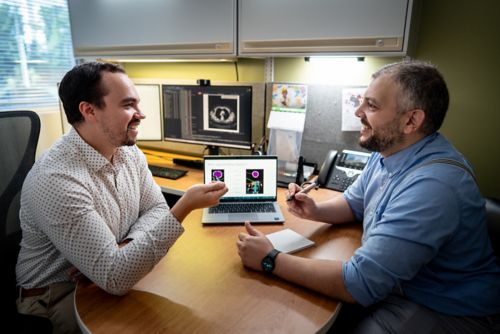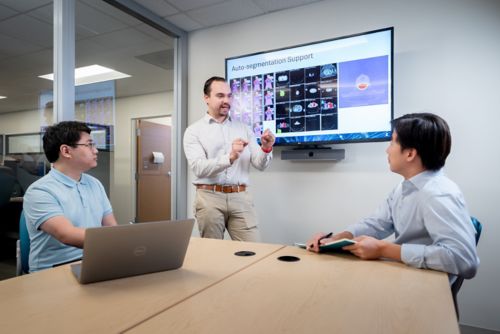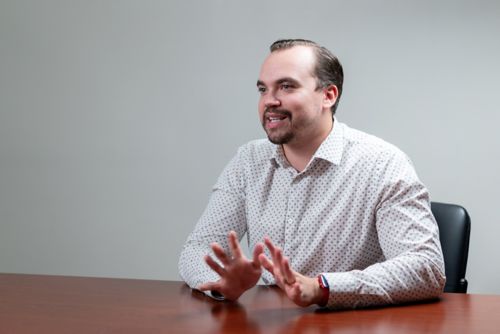St. Jude Family of Websites
Explore our cutting edge research, world-class patient care, career opportunities and more.
St. Jude Children's Research Hospital Home

- Fundraising
St. Jude Family of Websites
Explore our cutting edge research, world-class patient care, career opportunities and more.
St. Jude Children's Research Hospital Home

- Fundraising
Zachary Wooten Group
The Wooten group provides statistical support and machine-learning based methodological innovations for diagnosis and treatment planning.
About the group
The Wooten group is focused on the development of AI-based diagnosis and treatment planning tools for pediatric use. AI-aided diagnostic technology can significantly streamline clinical workflow and increase accessibility to care. However, significant technical advances are needed to produce robust, high-quality software that are standardized in performance across platforms and institutions. The Wooten group collaborates with the departments of Radiology and Radiation Oncology in developing image-based, AI-aided diagnostic software for treatment planning in pediatric oncology. Concurrently, the group also works with investigators from the Department of Psychology and Biobehavioral Sciences on various projects assessing the longitudinal health outcomes of patients with childhood catastrophic diseases.

Research summary
The longitudinal research focus of the Wooten group is the development of deep-learning tools to aid medical diagnosis and treatment planning. Machine learning or artificial intelligence (AI) is increasingly used in imaging-based medical diagnosis due to their pattern recognition capabilities. AI-aided diagnosis and treatment planning have the potential to significantly lessen clinician workload, reduce human error, and increase accessibility to care. However, current AI-based diagnostic tools are limited in quality control. Furthermore, available technology tends to focus on adult patients and diseases. There is therefore a lack of robust AI-based diagnosis and treatment planning tools for pediatric use. One aspect of Dr. Wooten’s work is toward the improvement and development of imaging-based AI diagnosis software for the pediatric setting.

Currently, Dr. Wooten’s group collaborates with the Department of Radiation Oncology on the development of AI tools for automated organ segmentation in pediatric radiation therapy. Additionally, other collaborative projects with faculty from the Department of Radiology are geared to examine the interpretability and failure modes of clinical AI systems, with the goal of identifying when and why these tools underperform in practice.
Furthermore, the Wooten group provides biostatistical support for a vast array of neurocognitive studies in collaboration with the Department of Psychology and Biobehavioral Sciences. Many of these projects involve the analysis of longitudinal health outcomes from data repositories such as the Sickle Cell Clinical Research and Intervention Program (SCCRIP) and St. Jude LIFE.
Software
Location-smoothed Bayesian Adaptive Regression Tree (lsBART):
lsBART is an AI-based quality assurance software that integrates with existing organ contouring technology for use with CT and MRI images to segment organs and tissues. lsBART uses shape statistics and smoothing algorithms to create 3D models of whole organs and structures, adjusting for varying image qualities and modalities. In this way, lsBART can pinpoint potential AI-generated contouring errors by flagging individual images that require human supervision.
Related publication
Zachary T Wooten, Mary Pham, Laurence E Court, Christine B Peterson, Location smoothed Bayesian additive regression trees: a method for interpretable and robust quality assurance of organ contours in radiotherapy treatment planning, Journal of the Royal Statistical Society Series C: Applied Statistics, 2025;, qlaf024, https://doi.org/10.1093/jrsssc/qlaf024
Publications
About Zachary Wooten
Dr. Zachary Wooten is an Instructor at St. Jude Children’s Research Hospital. He received his PhD in Statistics from Rice University, during which time he developed an interest in the use of AI for medical diagnosis thru image analysis. Prior to joining the St. Jude faculty, Dr. Wooten collaborated with investigators at MD Anderson Cancer Center on the development of AI tools for tissue and organ identification and contouring for diagnostic purposes. Presently, Dr. Wooten collaborates with faculty in the departments of Psychology and Biobehavioral Sciences, Radiation Oncology, and Radiology to conducts studies spanning image analysis, deep learning technologies, and biobehavioral data analysis. His longitudinal goal is to expand the responsible use of machine learning technologies for the diagnosis and treatment planning of pediatric therapies.

Contact us
Zachary Wooten, PhD
Instructor
Department of Biostatistics
MS 768, Room S2020
St. Jude Children's Research Hospital

Memphis, TN, 38105-3678 USA GET DIRECTIONS